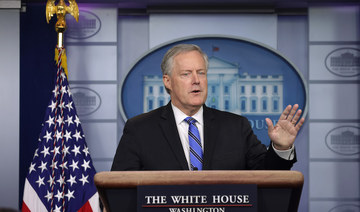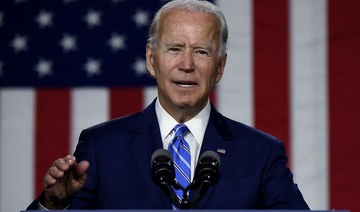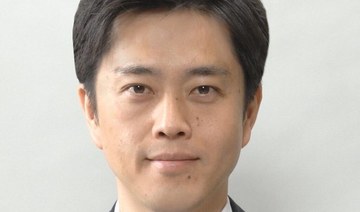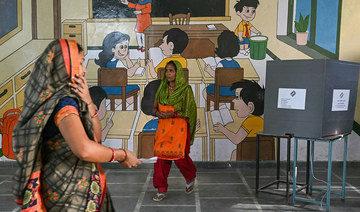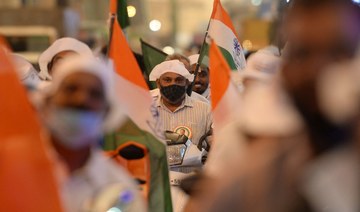WASHINGTON: US intelligence officials believe that Russia is using a variety of measures to denigrate Democratic presidential candidate Joe Biden ahead of the November election and that individuals linked to the Kremlin are boosting President Donald Trump’s reelection bid, the country’s counterintelligence chief said Friday in the most specific warning to date about the threat of foreign interference.
US officials also believe that China does not want Trump to win a second term and has accelerated its criticism of the White House, expanding its efforts to shape public policy in America and to pressure political figures seen as opposed to Beijing’s interests.
The statement from William Evanina is believed to be the most pointed declaration by the US intelligence community linking the Kremlin to efforts to get Trump reelected — a sensitive subject for a president who has rejected intelligence agency assessments that Russia tried to help him in 2016.
It also links Moscow’s disapproval of Biden to his role in shaping Obama administration policies supporting Ukraine, an important US ally, and opposing Russian leader Vladimir Putin. That assertion conflicts with the narrative advanced by Trump, who has made unsubstantiated claims that Biden’s actions in Ukraine were intended to help the business interests of his son, Hunter.
Evanina’s statement, three months before the election, comes amid criticism from House Speaker Nancy Pelosi and other congressional Democrats that the intelligence community has been withholding from the public specific intelligence information about the threat of foreign interference in American politics.
“The facts are chilling,” Sen. Richard Blumenthal, D-Connecticut, wrote in an op-ed published Friday evening in The Washington Post. “I believe the American public needs and deserves to know them. The information should be declassified immediately.”
The latest intelligence assessment reflects concerns not only about Russia but China and Iran as well, warning that hostile foreign actors may seek to compromise election infrastructure, interfere with the voting process or call into question voting results. Despite those efforts, officials see it as unlikely that anyone could manipulate voting results in any meaningful way, Evanina said.
“Many foreign actors have a preference for who wins the election, which they express through a range of overt and private statements; covert influence efforts are rarer,” said Evanina, director of the National Counterintelligence Security Center. “We are primarily concerned about the ongoing and potential activity by China, Russia and Iran.”
Concerns about election interference are especially acute following a wide-ranging effort by Russia to meddle in the 2016 election on Trump’s behalf through both the hacking of Democratic emails and a covert social media campaign aimed at sowing discord among US voters. Trump has routinely resisted the idea that the Kremlin favored him in 2016, but the intelligence assessment released Friday indicates that unnamed Kremlin-linked actors are again working to boost his candidacy on social media and Russian television.
The White House responded to Friday’s news with a statement saying “the United States will not tolerate foreign interference in our electoral processes and will respond to malicious foreign threats that target our democratic institutions.”
In a separate statement, the Trump campaign said it didn’t want or need foreign assistance and said China and Iran were opposed to Trump because “he has held them accountable after years of coddling by politicians like Joe Biden.”
Tony Blinken, a senior adviser to Biden’s campaign, responded Friday that Trump “has publicly and repeatedly invited, emboldened, and even tried to coerce foreign interference in American elections. ... Joe Biden, on the other hand, has led the fight against foreign interference for years.”
Pelosi and Intelligence Committee Chairman Adam Schiff, both California Democrats, said in a statement Friday that they were “pleased that Mr. Evanina heeded our call to make additional details public about Russia’s malign interference campaign.” But they also criticized him for naming Iran and China “as equal threats to our democratic elections.”
Democrats in Congress who have participated in recent classified briefings on the election interference threat have expressed alarm at what they have heard. They have urged the US intelligence community to make public some of their concerns, in part to avoid a repeat of 2016, when Obama administration officials were seen as slow and overly deliberate in their public discussion of active Russian measures in that year’s election.
When it comes to Russia this year, US intelligence officials assess that it is working to “denigrate” Biden and what it sees as an anti-Russia “establishment” among his supporters, Evanina said. US officials believe that tracks Moscow’s criticism of Biden when he was vice president for his role in Ukraine policies and his support of opposition to Putin inside Russia.
The US statement called out by name Andriy Derkach, a pro-Russia Ukrainian lawmaker who has been active in leveling unsubstantiated corruption allegations against Biden and his son concerning Burisma, the Ukrainian natural gas company on whose board Hunter Biden sat. That effort has included publicizing leaked phone calls.
Democrats, including members of the Senate intelligence panel, have voiced concerns that an ongoing Republican probe into Hunter Biden and his work in Ukraine would parallel Russian efforts and amplify Russian disinformation. That investigation is being led by Sen. Ron Johnson of Wisconsin, the chairman of Senate Homeland Security and Governmental Affairs committee. He has denied any wrongdoing.
Though US officials allege that China has its own preference, the statement Friday did not directly accuse Beijing of election interference or taking action to prop up Biden.
Instead, the statement said, China views Trump as “unpredictable” and does not want to see him win reelection, Evanina said. China has been expanding its influence efforts ahead of the November election in an effort to shape US policy and pressure political figures it sees as against Beijing. The Trump administration’s relationship with China has taken a starkly more adversarial tone, including the closure last month of Beijing’s consulate in Houston and an executive order Thursday that banned dealings with the Chinese owners of consumer apps TikTok and WeChat,
“Although China will continue to weigh the risks and benefits of aggressive action, its public rhetoric over the past few months has grown increasingly critical of the current administration’s COVID-19 response, closure of China’s Houston consulate and actions on other issues,” Evanina wrote.
On Iran, the assessment said Tehran seeks to undermine US democratic institutions as well as Trump and divide America before the election.
“Iran’s efforts along these lines probably will focus on online influence, such as spreading disinformation on social media and recirculating anti-US content,” Evanina wrote. “Tehran’s motivation to conduct such activities is, in part, driven by a perception that President Trump’s re-election would result in a continuation of US pressure on Iran in an effort to foment regime change.”
During a panel discussion later Friday at the DEF CON hacker convention, federal cybersecurity officials were asked which foreign threat they considered most serious. “I don’t think I would say one is scarier than the other per se. Certainly some of these adversaries are at little bit more experienced,” said the National Security Agency’s election lead, David Imbordino.
“I couldn’t agree more,” said Cynthia Kaiser, the FBI’s deputy chief of analysis for national cyber threats. “If if you ask me what the biggest threat is, its the kind of constant drumbeat or influence campaigns that are going to make people feel like they are less confident in our (elections) system.”
Russia, China, Iran trying to meddle in US 2020 election, warn Intel officials
https://arab.news/w5kcy
Russia, China, Iran trying to meddle in US 2020 election, warn Intel officials
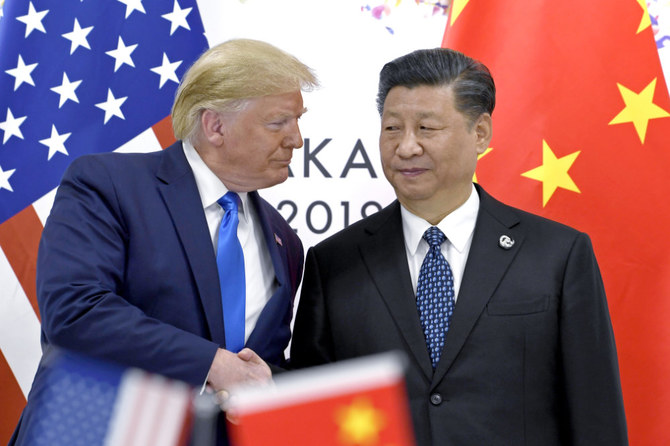
- Russia accused of acting against Biden, while China opposes Trump
- Trump claims Iran is also helping ensure he does not win a second term
Saudi Pavilion at Expo 2025 Osaka: A journey through Saudi Arabia’s transformation, Vision for Future
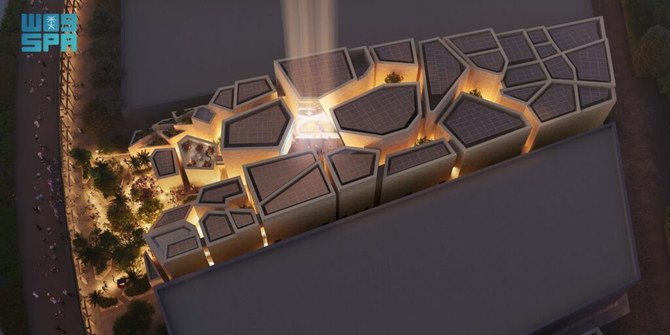
- Saudi chefs will present a mix of flavours inspired by different regions of the Kingdom
- More than 200 selections of souvenirs will be displayed in the gift shop, each a testament to authentic Saudi craftsmanship
OSAKA: The Saudi pavilion participating in Expo 2025 Osaka in Japan has announced an unprecedented cultural and artistic program encompassing more than 700 events to introduce visitors to Saudi Arabia’s rich heritage, mega projects and various economic opportunities.
The Saudi pavilion at the expo will present Saudi Arabia’s past, transformational journey and vision for a sustainable and prosperous future. It will include a wide range of performances, such as traditional arts, classical music and fashion shows.
Saudi chefs will present a mix of flavours inspired by different regions of the Kingdom, and Saudi musicians and artists will perform daily to highlight the Kingdom’s rich cultural heritage.
A dedicated area for prominent figures will host various sessions and display a series of presentations to inform companies and investors of all the economic opportunities available in the Kingdom.
More than 200 selections of souvenirs will be displayed in the gift shop, each a testament to authentic Saudi craftsmanship.
Visitors from around the world will learn about AlUla City, located in north-west Saudi Arabia, which is home to dramatic desert landscapes, spectacular rock formations and some of the Middle East’s most significant ancient sites.
Major Saudi projects will be highlighted, including NEOM, the land of the future; THE LINE, the 170-kilometer-long city that will be the future of urban living; Oxagon, which is redefining the traditional industrial model; and Trojena, the mountain resort of NEOM.
The pavilion will also showcase aspects of ‘Green Riyadh,’ a revolutionary project that aims to transform Saudi Arabia’s capital into a green oasis by planting 7.5 million trees by 2030. This project aims to place Riyadh as one of the world’s top 100 most livable cities.
It will also highlight the Reefscape Restoration Initiative, launched by the King Abdullah University of Science and Technology (KAUST). This initiative seeks to conserve, enhance, and restore 100 hectares of coral reefscape in the Red Sea and design and build the world’s largest Coral Nursery at Jeddah beach, with an expected coral production of 400k per year.
General Commissioner of the Saudi Pavilion Othman Al-Mazyad said: “We look forward to enabling visitors of the Saudi pavilion to learn about the Kingdom, its traditions, journey of transformation and vision for a sustainable future.”
Relations between Saudi Arabia and Japan have been continuously growing, thanks to the Saudi-Japanese Vision 2030. The Saudi Pavilion at Expo 2025 Osaka will allow companies and investors from Japan and worldwide to learn about the Kingdom’s various opportunities, aiming to forge new partnerships and expand existing agreements.
India’s mammoth election heats up in trend-defining second phase
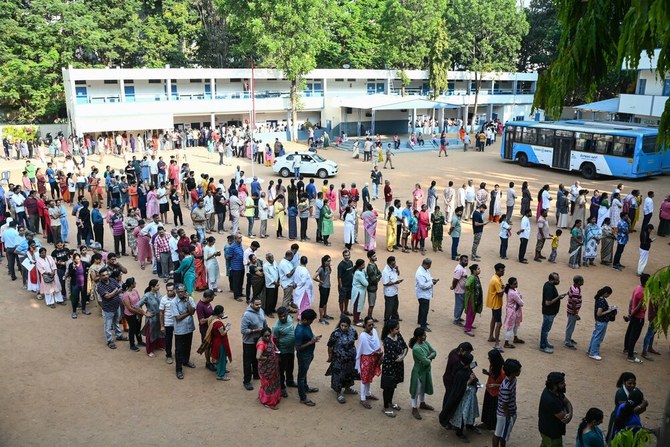
- Second phase is seen by analysts as defining dynamics of rest of the polls
- Turnout in first phase was lower than expected — 66 percent, compared with 70 percent in 2019
NEW DELHI: India’s mammoth general election rolled on Friday into its second phase, which is widely believed to likely set the trend for the rest of the polls.
More than 968 million voters were registered to cast the ballot vote in the world’s most populous country, where incumbent Prime Minister Narendra Modi and his Hindu nationalist Bharatiya Janata Party are eyeing a rare third straight five-year term in power.
The first phase of the vote was on April 19 as polling takes place over six weeks, with results expected on June 4. The other voting dates will be May 7, May 13, May 20, May 25 and June 1.
India has a total of 28 states and eight federally governed territories. Some regions complete the process on a single day, and others spread it out over several phases.
Voting last week took place in 21 states and union territories, with nearly 169 million people eligible to cast their ballots. In the second phase, more than 160 million people were expected to vote across 13 states and federal territories.
As many as 1,202 candidates contested the polls on Friday, vying for 88 of the 543 seats in the lower house of Parliament. In the previous phase, 102 seats were up for grabs.
More than half of the 88 seats were in the southern states of Kerala and Karnataka and the northwestern state of Rajasthan.
The party or coalition that wins at least 272 seats will form the government.
Modi, who ahead of the election was targeting 400 seats for his BJP-led National Democratic Alliance, is challenged by an alliance of two dozen opposition parties — the Indian National Developmental Inclusive Alliance, or INDIA, led by the Congress party, which has ruled the country for close to 45 years since independence in 1947.
‘MINI-GENERAL ELECTION’
The second phase of India’s polls is seen by analysts as defining the dynamics of the remaining five phases. One of the factors was the voter turnout, which in this election might be lower.
In the first phase, 66 percent of those eligible to vote cast their ballot — compared with 70 percent in 2019.
“From the first phase of the election, the message went that there is a silent undercurrent against the BJP and the dip in the voting percentage sent the signal that the BJP would slip in its strongholds in northern India particularly Uttar Pradesh,” Umakant Lakhera, political commentator in Delhi, told Arab News.
“If the trend of voters’ perceived apathy toward the election in general — and the BJP in particular — continues, then it’s an opportunity for the opposition Congress party to consolidate and mobilize its resources to widen its reach and capitalize on anti BJP sentiment.”
The key leader of the opposition coalition and Congress member is Rahul Gandhi, the son of Rajiv Gandhi, a grandson of Indira Gandhi, and a great-grandson of Jawaharlal Nehru, all of whom served as prime ministers of India.
Gandhi is seeking re-election from Wayanad in Kerala — the only major state that has never elected a BJP member of parliament, and where it was not a main competitor. This year, Modi’s party has been trying to make inroads into the state’s political scene.
The main contenders, besides Gandhi, are Annie Raja of the Communist Party of India and BJP’s K. Surendran.
“Kerala always has witnessed bipolar politics, but the BJP has been trying this time to make it a triangular contest, and this election will test whether a third force can find space in Kerala or not,” Prof. G. Gopa Kumar, political scientist and adviser to the Kerala-based Center for Public Policy Research, told Arab News.
“The second phase will test whether the stigma of the BJP of being an outsider in Kerala will continue or not, whether the stigma of not winning a seat in Kerala will continue or not.”
Far from Kerala, in the north, where several states were also going to the polls, another test was taking place at the same time — for the Congress party. Congress plunged to a historic low when it was swept out of power by the BJP in the 2014 general vote, and won its second-lowest number of 52 seats in 2019.
“The second phase is a mini-general election. What is at stake is whether the Congress is going to challenge the dominance of the BJP in the north Indian states like Uttar Pradesh, Rajasthan, Madhya Pradesh or not,” Kumar said.
“The contest is getting serious from now on. For the Congress, it is a survival question as they have to prove that they can defeat the BJP and survive as a big force.”
Although surveys suggest Modi will easily win a comfortable majority in parliament, his 400-seat target, often repeated ahead of the polls, has not been cited since last week’s first phase.
Asad Rizvi, an analyst based in Lucknow, the capital of India’s most populous state and BJP stronghold, Uttar Pradesh, said that the performance was apparently not as good as expected, despite the repetition of the party’s tactics of polarization along religious lines.
“A perception has come to dominate after the first phase of elections that the BJP has not performed well in its strongholds in Uttar Pradesh, therefore, the BJP will have a tough time mobilizing its core voters to retain the seats,” he told Arab News.
“The second phase is also crucial that will test whether the BJP’s communal agenda is working or not.”
Ukraine’s Zelensky calls for air defense systems as allies meet
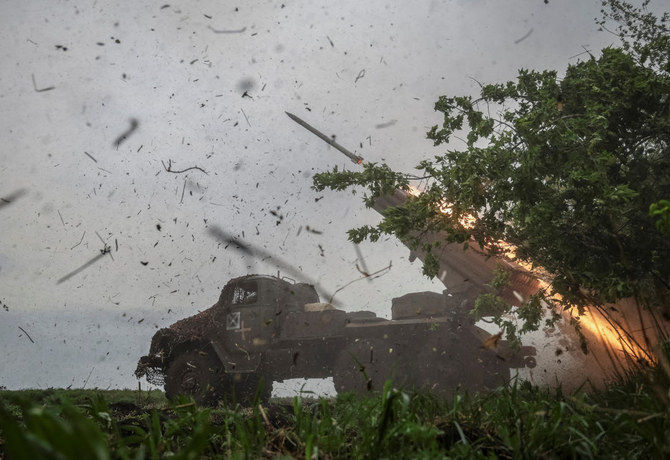
- “We need the ability to shoot down the air combat aircraft so that they do not approach our positions and borders,” Zelensky said
- US Defense Secretary Lloyd Austin said the meeting would focus on Ukraine’s air defense capabilities
WASHINGTON: Ukrainian President Volodymyr Zelensky on Friday called for additional air defense systems to be sent to Kyiv to help protect against Russian strikes, adding that a pause in US funding had helped Moscow seize the initiative.
“This year, Russian jets (have) already used more than 9,000 guided aerial bombs against Ukraine and we need the ability to shoot down the air combat aircraft so that they do not approach our positions and borders,” Zelensky said at the start of a virtual meeting led by the United States on helping arm Ukraine.
US Defense Secretary Lloyd Austin said the meeting would focus on Ukraine’s air defense capabilities.
The meeting comes days after Congress emerged from a half-year of deadlock to approve a $61 billion aid package for Ukraine. President Joe Biden’s administration quickly announced $1 billion in artillery, air defenses and other hardware would soon be heading to Ukrainian front lines.
“While we were waiting for a decision on the American support, the Russian army managed to seize the initiative on the battlefield,” Zelensky said.
“We can still now, not only stabilize the front, but also move forward achieving our Ukrainian goals in the war,” he added.
The United States hopes its new deliveries of weaponry will help Ukraine rebuild defenses and refit its forces as it recovers from a gap in US assistance, but it does not expect Kyiv to launch large-scale offensive operations against Russian forces in the near term.
The influx of weapons could improve Kyiv’s chances of averting a major Russian breakthrough in the east, just over two years since the start of Moscow’s full-scale invasion, military analysts say.
But it remains unclear how much pressure Kyiv can apply on Russia after months of rationing artillery as its stocks ran low. Kyiv also faces manpower shortages on the battlefield and questions linger over the strength of its fortifications along a sprawling, 1,000-km (621-mile) front line.
India’s mammoth election heats up in trend-defining second phase
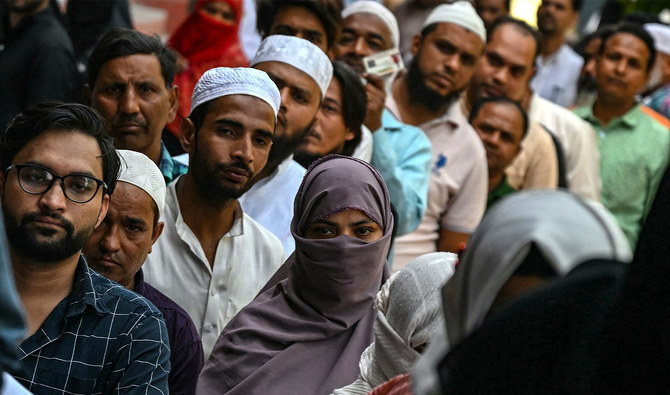
- Turnout in first phase lower than expected at 66 percent compared with 70 percent in 2019
- PM Modi and his BJP are eyeing a rare third straight five-year term in power
NEW DELHI: India’s mammoth general election rolled on Friday into its second phase, which analysts widely believe will likely set the trend for the rest of the polls.
More than 968 million voters are registered to cast the ballot vote in the world’s most populous country, where incumbent Prime Minister Narendra Modi and his Hindu nationalist Bharatiya Janata Party are eyeing a rare third straight five-year term in power.
Modi, who ahead of the election was targeting 400 seats for his BJP-led National Democratic Alliance led by his BJP, is challenged by an alliance of two dozen opposition parties: the Indian National Developmental Inclusive Alliance, or INDIA, led by the Congress Party, which has ruled the country for close to 45 years since independence in 1947.
The first phase of the vote took place on April 19. Polling will go on for six weeks, with results expected on June 4. The other voting dates will be May 7, May 13, May 20, May 25 and June 1.
Analysts say the second phase of India’s polls will define the dynamics of the remaining five phases.
In the first phase, 66 percent of those eligible to vote cast their ballot, compared with 70 percent in 2019.
“From the first phase of the election, the message went that there is a silent undercurrent against the BJP and the dip in the voting percentage sent the signal that the BJP would slip in its strongholds in northern India particularly Uttar Pradesh,” Umakant Lakhera, political commentator in Delhi, told Arab News.
“If the trend of voters’ perceived apathy toward the election in general, and the BJP in particular, continues, then it’s an opportunity for the opposition Congress party to consolidate and mobilize its resources to widen its reach and capitalize on anti BJP sentiment.”
India has a total of 28 states and eight federally governed territories. Some regions complete the voting process in a single day, and others have it spread out in several phases.
Voting last week took place in 21 states and union territories, with nearly 169 million people eligible to cast their ballots. In the second phase, more than 160 million people are expected to vote across 13 states and federal territories.
As many as 1,202 candidates contested the polls on Friday, vying for 88 of the 543 seats in the lower house of Parliament. In the previous phase, 102 seats were up for grabs.
More than half of the 88 seats were in the southern states of Kerala and Karnataka and the northwestern state of Rajasthan.
The party or coalition that wins at least 272 will form the government.
‘MINI GENERAL ELECTION’
The key leader of the opposition coalition and a Congress member is Rahul Gandhi, the son of Rajiv Gandhi, a grandson of Indira Gandhi, and a great-grandson of Jawaharlal Nehru, all of whom have served as prime ministers of India.
But the Congress plunged to a historic low when it was swept out of power by the BJP in the 2014 general vote, and won its second-lowest number of 52 seats in 2019.
Gandhi is seeking re-election from Wayanad in Kerala, the only major state that has never elected a BJP member of parliament, and where Modi’s party was not a main competitor but has been trying to make inroads since last year.
The main contenders, besides Gandhi, are Annie Raja of the Communist Party of India and BJP’s K. Surendran.
“Kerala always has witnessed bipolar politics, but the BJP has been trying this time to make it a triangular contest, and this election will test whether a third force can find space in Kerala or not,” Prof. G. Gopa Kumar, political scientist and adviser to the Kerala-based Center for Public Policy Research, told Arab News.
“The second phase will test whether the stigma of the BJP of being an outsider in Kerala will continue or not, whether the stigma of not winning a seat in Kerala will continue or not.”
Another test for the Congress will be far from Kerala, in the north, where several states were also going to the polls.
“The second phase is a mini-general election. What is at stake is whether the Congress is going to challenge the dominance of the BJP in the north Indian states like Uttar Pradesh, Rajasthan, Madhya Pradesh or not,” Kumar said.
“The contest is getting serious from now on. For the Congress, it is a survival question as they have to prove that they can defeat the BJP and survive as a big force.”
Although surveys suggest Modi will easily win a comfortable majority in parliament, his 400-seat target often repeated ahead of the polls has not been cited since last week’s first phase.
Asad Rizvi, an analyst based in Lucknow, the capital of India’s most populous state and BJP stronghold, Uttar Pradesh, said the party’s performance was not as good as expected despite its tactic to polarize along religious lines.
“A perception has come to dominate after the first phase of elections that the BJP has not performed well in its strongholds in Uttar Pradesh, therefore, the BJP will have a tough time mobilizing its core voters to retain the seats,” he told Arab News.
“The second phase is also crucial that will test whether the BJP’s communal agenda is working or not.”
Blinken says Gaza protests a hallmark of democracy, decries ‘silence’ on Hamas
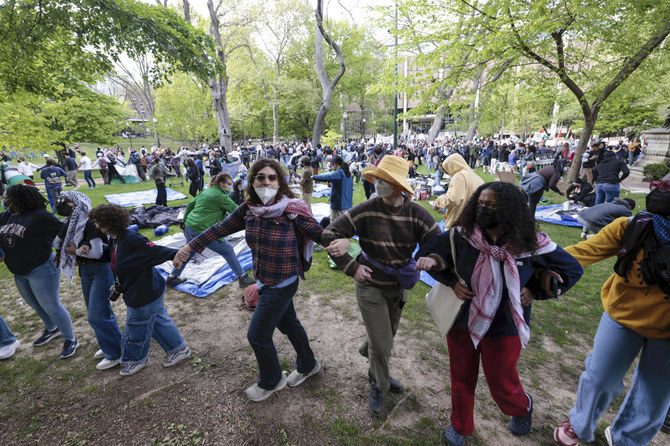
- Police have clashed with students critical of the war and the Biden administration’s support for Israel’s war in Gaza
- Blinken said he understood the conflict elicited “strong, passionate feelings” and that the administration was doing it all it could to halt the war
BEIJING: US Secretary of State Antony Blinken said on Friday protests at US universities over US-ally Israel’s war in Gaza are a hallmark of American democracy, but criticized what he called the “silence” about Palestinian militant group Hamas.
Police have clashed with students critical of the war and the Biden administration’s support for Israel’s war in Gaza, with nearly 550 arrests made over the protests in the last week across major US universities, according to a Reuters tally.
Asked at a press conference in China whether he was taking on board the protesters’ message, Blinken said he understood the conflict elicited “strong, passionate feelings” and that the administration was doing it all it could to halt the war.
“In our own country, it’s a hallmark of our democracy that our citizens make known their views, their concerns, their anger, at any given time, and I think that reflects the strength of the country, the strength of democracy,” Blinken said.
But he suggested critics should focus their ire on Hamas militants who sparked the war with their Oct. 7 attack on southern Israel in which about 1,200 people were killed and some 250 taken hostage, according to Israeli tallies.
Israel’s military response has killed more than 34,000 Palestinians and injured more than 77,000, according to the health ministry in Hamas-ruled Gaza.
“It is also notable that there is silence about Hamas, as if it wasn’t even part of the story,” Blinken said.
“But as I’ve also said repeatedly, the way Israel goes about ensuring that Oct. 7 never happens again matters profoundly. And we’re working every day to try to minimize the damage that’s done to innocent people and to make sure that they have the assistance and support that they need.”
Blinken, who met Chinese President Xi Jinping and other officials in Beijing on Friday, said he had discussed how China can play a constructive role in global crises, including in the Middle East, where he said Beijing can discourage Iran and its proxies not to escalate the conflict.
Blinken said he spoke to Foreign Minister Wang Yi multiple times this month when tensions spiked between Israel and Tehran. China is the main buyer of oil exported by sanctions-hit Iran.
“I think the relationships, again, that China has can be positive in trying to calm tensions, prevent escalation, avoid the spread of the conflict, and we agreed that we’d remain in regular in regular touch on this, and that’s certainly my intention,” Blinken said.




